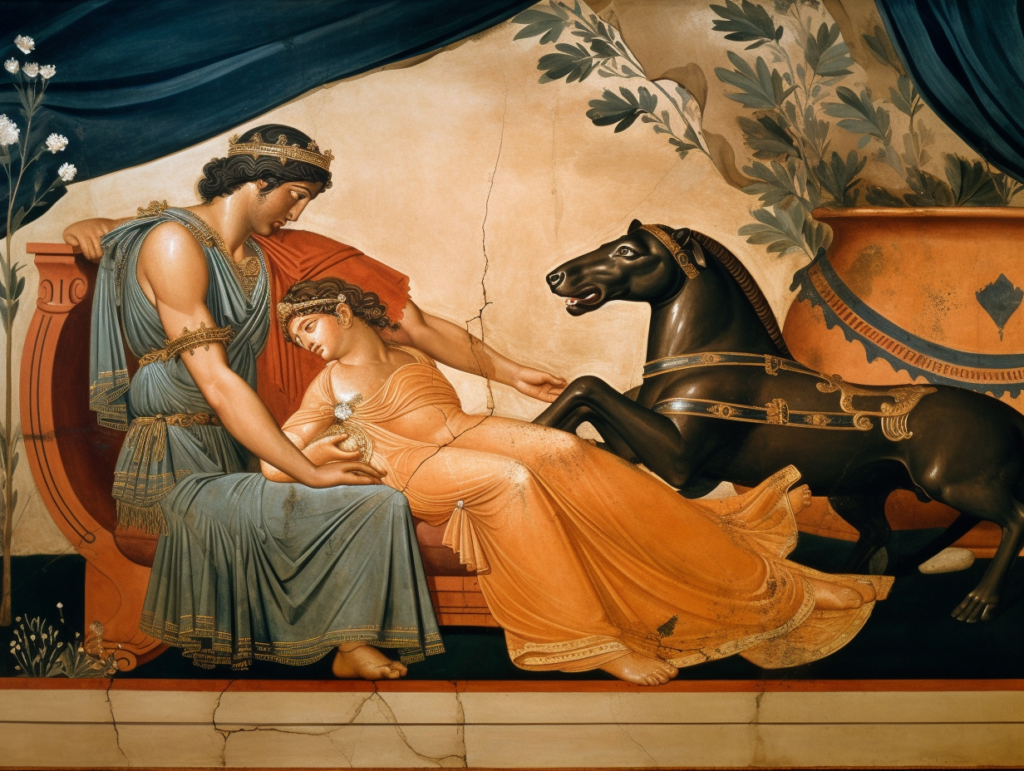Do you want to know the incredible story of the birth of Achilles in Greek mythology?
Get ready for a tale filled with prophecies, divine interventions, and hidden identities.
In this article, you’ll discover how a powerful prophecy set the stage for Achilles’ birth and how his parents, Thetis and Peleus, played a crucial role.
Brace yourself for an adventure as we delve into the captivating story of Achilles, a hero destined for glory.
Key Takeaways
- Achilles’ birth was prophesied to make him a mighty warrior but also meet an early death.
- Thetis, a sea goddess, married Peleus to ensure the birth of Achilles and protect him from his fate.
- Thetis sought to protect Achilles by dipping him in the River Styx, making him invulnerable except for his heel.
- Achilles’ true identity was discovered, shaping him into the legendary hero he became and influencing the outcome of the Trojan War.
The Prophecy of Achilles’ Birth
Did you know that there was a prophecy about Achilles’ birth in Greek mythology? The prophecy’s significance in shaping the destiny of Achilles can’t be overstated. According to the prophecy, Achilles would become a mighty warrior but would also meet an early death. This foretelling had a profound impact on the decisions made by both mortals and gods.
The role of the gods in the prophecy can’t be ignored. It was the goddess Thetis, Achilles’ mother, who received the prophecy from the gods. The gods themselves, with their knowledge of the future, played an active part in shaping the events that led to Achilles’ birth. They orchestrated the marriage between Thetis and Peleus, Achilles’ mortal father, ensuring that their union would bring forth the hero who’d play a pivotal role in the Trojan War.
The gods’ involvement in the prophecy raises questions about the extent of human agency and free will. Did Achilles have a choice in embracing his destiny as a warrior, knowing it would lead to his untimely demise? Or was he merely a pawn in the gods’ game of fate? These are questions that continue to captivate the minds of those who desire freedom and control over their own lives.
The Divine Intervention: Thetis and Peleus
Now let’s talk about the divine intervention that shaped Achilles’ birth.
Thetis, a sea goddess, had foreseen her son’s fate and took steps to protect him.
She married Peleus, a mortal hero, in order to create a powerful lineage for their child.
Thetis’ Prophecy and Fate
You will often hear about the prophecies and fates surrounding Thetis and Peleus in the birth of Achilles in Greek mythology. Thetis, a sea nymph, was destined to give birth to a son who’d be greater than his father. But Zeus, the king of gods, feared this prophecy and sought to prevent it by arranging Thetis’ marriage to a mortal, Peleus.
The significance of Achilles’ birth lies in the divine intervention that took place. Thetis, knowing the fate that awaited her son, sought to protect him by dipping him into the River Styx, making him invulnerable except for his heel, which was left untouched. This act would later lead to Achilles’ downfall in the Trojan War.
The intertwining of prophecy and fate in Achilles’ birth sets the stage for the epic tale that unfolds.
Peleus’ Marriage to Thetis
There were many challenges and obstacles that Peleus and Thetis faced in their marriage, but they were ultimately blessed with the birth of Achilles. Their love story was one of divine intervention and perseverance.
The wedding of Peleus and Thetis was a grand affair, attended by gods and goddesses from all corners of the realm. The ceremony took place on the sacred Mount Pelion, where the couple exchanged their vows under the watchful eyes of Zeus and Hera. The atmosphere was filled with joy and celebration, as the union of a mortal and a goddess was a rare occurrence.
Despite the initial difficulties, their love triumphed, setting the stage for the next chapter in Achilles’ story. And so, with the wedding of Peleus and Thetis complete, the stage was set for the immortalizing ritual: Achilles and the River Styx.
The Immortalizing Ritual: Achilles and the River Styx
Now let’s talk about how Achilles achieved immortality through the ritual of being dipped in the River Styx.
This baptism in the sacred river rendered his entire body invulnerable, except for his heel where his mother held him.
This vulnerability would ultimately have grave consequences for Achilles in the Trojan War.
Immortality Through River Baptism
Achilles became invulnerable to harm after his mother dipped him into the River Styx, making him almost invincible. The river’s waters possessed an immortalizing power, granting him divine protection.
Picture this:
- The River Styx, a dark and mysterious body of water, flowing with an otherworldly energy.
- Thetis, Achilles’ mother, holding him tightly as she lowers him into the water, her heart filled with both fear and hope.
- The river’s icy touch enveloping Achilles, his tiny body shivering from the intensity of the divine power coursing through him.
- A radiant glow emanating from his skin as the waters bestow upon him the gift of immortality.
- Achilles emerging from the river, transformed and blessed by the gods, his destiny forever intertwined with the epic tales of heroism and valor.
In this act of baptism, Achilles gains an immortalizing power, ensuring his divine protection and setting him on a path that will change the course of history.
Achilles’ Invulnerable Heel
Immerse yourself in the myth as you discover the significance of Achilles’ invulnerable heel, a result of the immortalizing ritual performed at the River Styx.
Achilles, known as the mighty warrior and hero of the Trojan War, possessed a tragic flaw that ultimately led to his downfall. His mother, Thetis, dipped him into the River Styx, holding him by his heel, making that part of his body invulnerable. This act was meant to protect Achilles from harm, but unknowingly, it also became his Achilles’ heel, his one vulnerable spot.
Throughout the Trojan War, Achilles played a crucial role, leading the Greek forces and displaying unmatched bravery and skill. However, his invincibility came to an end when he was struck by an arrow in his heel, the only part of his body that remained vulnerable.
Thus, the immortalizing ritual at the River Styx, meant to ensure his protection, ultimately sealed his tragic fate.
The Consequences of Vulnerability
Step into the world of Greek mythology and witness the lasting impact of Achilles’ vulnerability caused by the immortalizing ritual performed at the River Styx. The consequences of this vulnerability are far-reaching and deeply woven into Achilles’ story. Here are three ways in which his vulnerability shaped his journey:
- Emotional growth: Achilles’ vulnerability allowed him to develop a deeper understanding of his own emotions. It forced him to confront his fears and insecurities, ultimately leading to personal growth and self-discovery.
- Vulnerability in relationships: Achilles’ experience with vulnerability taught him the importance of trust and openness in relationships. It made him realize that true strength lies in being vulnerable with others and forming genuine connections.
- The burden of invincibility: The immortalizing ritual made Achilles physically invulnerable, but it also burdened him with the knowledge that he was destined to die young. This knowledge affected his choices and actions, adding a layer of complexity to his character.
Through these consequences, Achilles’ vulnerability serves as a powerful reminder that even the strongest among us aren’t immune to the challenges and complexities of human experience.
The Hidden Identity: Achilles as a Girl
As you delve deeper into the myth of Achilles, you will discover the hidden identity of Achilles as a girl. This revelation adds an intriguing layer to the story, challenging traditional notions of gender and identity in ancient Greek society. The hidden identity of Achilles as a girl can be seen as a form of gender transformation, a reflection of the fluidity of identity and the capacity for individuals to defy societal norms.
To better understand this hidden identity, let’s explore the myth through a table:
| Hidden Identity: Achilles as a Girl | |
|---|---|
| Mythology | In Greek mythology, Achilles was raised as a boy by his mother, Thetis, in an attempt to protect him from the Trojan War. To conceal his true identity, Thetis dressed Achilles as a girl and disguised him among the daughters of King Lycomedes. |
| Gender Transformation | The gender transformation of Achilles highlights the complexity of identity and challenges the rigid gender roles prevalent in ancient Greek society. It explores the idea that gender is not fixed, but rather a social construct that can be fluid and malleable. |
| Symbolism | This hidden identity serves as a symbol of strength and power, as Achilles, disguised as a girl, ultimately proves himself to be the greatest warrior of his time. It also emphasizes the theme of deception and the lengths one will go to protect their loved ones. |
It is through this hidden identity that the true essence of Achilles is revealed, setting the stage for the discovery of Achilles’ true identity in the subsequent section.
The Discovery of Achilles’ True Identity
As you uncover more details about the myth, you’ll find the shocking revelation of Achilles’ true identity. The mystery surrounding Achilles’ upbringing adds a sense of intrigue to his story.
Here are some key points to consider:
- Achilles was raised by his mother, Thetis, who played a crucial role in shaping his destiny. She was a powerful goddess and a devoted parent.
- Thetis knew of the prophecy that Achilles would die young if he went to war. To protect him, she disguised him as a girl and sent him to live among the women of the island of Scyros.
- As a girl, Achilles grew up unaware of his true identity. He learned the skills of weaving and household chores, as was expected of young women.
- However, Achilles’ true nature couldn’t be hidden forever. When the time came for him to fulfill his destiny as a hero, his true identity was revealed, and he embraced his role as a warrior.
The significance of Achilles’ relationship with his mother can’t be overstated. Thetis, a goddess, loved and protected her son, even going to great lengths to ensure his safety. Her actions shaped Achilles into the legendary hero he became.
With Achilles now aware of his true identity, his fate as a hero destined for glory awaits him. Let’s explore the next chapter of his story.
The Fate of Achilles: A Hero Destined for Glory
You will soon discover that Achilles, the hero destined for glory, faced a series of challenges and triumphs throughout his legendary journey.
One of the most significant dilemmas Achilles encountered was his moral dilemma. As a warrior, Achilles possessed incredible strength and skill, making him an invaluable asset to the Greeks in the Trojan War. However, he also had a deep sense of honor and justice.
When his comrade Patroclus was slain by Hector, Achilles was consumed by grief and sought revenge. In his pursuit of vengeance, he made a decision that had far-reaching consequences. Achilles abandoned his fellow Greeks and refused to fight in the war, causing the Trojans to gain an advantage. This decision tested Achilles’ loyalty and challenged his sense of duty.
Ultimately, it was only after the tragic death of his beloved friend that Achilles returned to the battlefield, fueled by a desire for retribution. His impact on the Trojan War was immense, as his return to battle was a turning point that shifted the tide in the Greeks’ favor.
Achilles’ destiny as a hero was fulfilled through his actions and the impact he had on the war.







